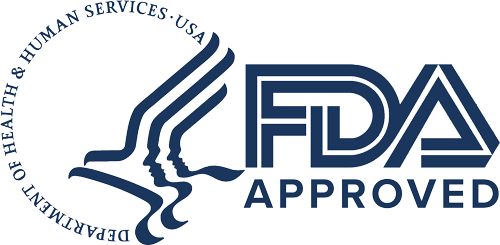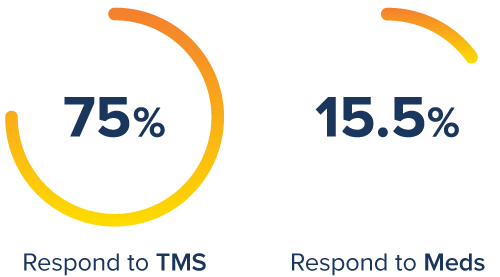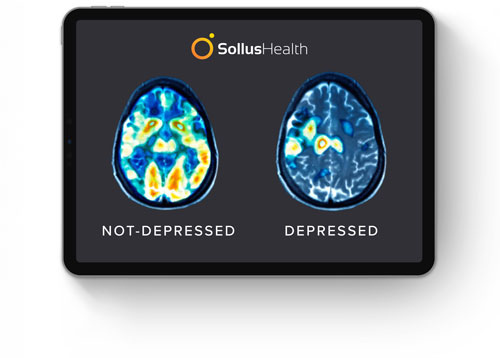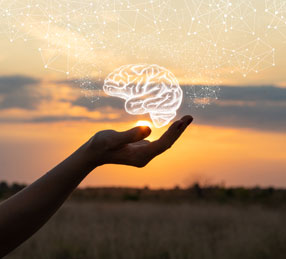Is TMS Right For You?
BREAKTHROUGH TECHNOLOGY
Experience Remission from Depression with TMS Therapy
TMS therapy in San Diego offers a non-invasive, drug-free approach to treating depression and other mental health conditions.
-
Covered by Insurance
-
FDA Approved
-
Covered by Insurance
-
FDA Approved
Life-Changing Results From Real Patients

TAKE THE FIRST STEP TODAY
TMS Covered by Major Insurance Companies

RESPONSE RATES
TMS Versus Medication

NEUROPLASTICITY
Brain Activity Increased with TMS

Proudly Serving San Diego Carlsbad Encinitas Oceanside San Marcos Vista
Break free from depression
Our team is here to guide you through a personalized journey to reclaim your mental health and regain control of your life.

Is TMS Right for You?
Transcranial Magnetic Stimulation (TMS) has emerged as a life-changing treatment for individuals struggling with mental health conditions, particularly when other therapies haven’t brought relief. If you’re considering TMS therapy in San Diego, here’s a guide to help you determine if it might be the right solution for you.
What is TMS Therapy?
TMS therapy is a non-invasive treatment that uses magnetic pulses to stimulate specific areas of the brain involved in mood regulation. This therapy targets areas like the prefrontal cortex, which can be underactive in individuals with depression, anxiety, and other mental health disorders. By stimulating these regions, TMS promotes better mood balance, making it a valuable option for those who haven’t found success with medications or talk therapy.
Is TMS Therapy in San Diego Effective for Mental Health Conditions?
TMS is often recommended when other treatments haven’t been successful. Its non-invasive nature—meaning it doesn’t require surgery or direct intervention beyond the skin—makes it an appealing option for many. TMS is also sometimes used as an alternative to electroconvulsive therapy (ECT) when ECT is ineffective or not an option.
In the United States, the FDA has approved TMS therapy for treating several conditions, including:
- Major Depressive Disorder (MDD), especially treatment-resistant depression.
- Obsessive-Compulsive Disorder (OCD).
- Migraines.
- Smoking cessation.
Beyond these, ongoing research explores whether TMS therapy in San Diego can effectively treat conditions like addiction, Alzheimer’s disease, chronic pain, post-traumatic stress disorder (PTSD), postpartum depression and fibromyalgia, among others. While these are not yet FDA-approved uses, studies indicate that TMS may be beneficial for a wide range of disorders.
Who Is a Good Candidate for TMS Therapy?
You may be an ideal candidate for TMS if you:
- Have Depression Resistant to Medication – TMS is especially effective for those who haven’t responded well to antidepressants or other traditional treatments.
- Are Sensitive to Medication Side Effects – TMS is medication-free, making it a great option for individuals who experience side effects like weight gain, fatigue, or sexual dysfunction from antidepressants. This also makes TMS a good option if you are pregnant.
- Need a Non-Invasive Option – TMS therapy is non-invasive and has minimal side effects, such as mild scalp discomfort, which makes it appealing to many patients.
An experienced mental health clinic in San Diego, such as Sollus Health, will assess your health history and symptoms to determine if TMS is the right approach for you.
Benefits of TMS Therapy?
Patients in San Diego and beyond have found significant relief from TMS therapy. Key benefits include:
- High Success Rate – TMS has shown success in reducing depression symptoms and improving quality of life.
- Minimal Side Effects – Unlike medication, TMS doesn’t typically cause side effects like drowsiness or nausea.
- Convenient Sessions – With sessions usually lasting 20–40 minutes and no downtime required, TMS is easy to integrate into your routine.
Where Can You Access TMS Therapy in San Diego?
If you’re exploring TMS therapy in San Diego, consider trusted providers like Sollus Health, which offers personalized treatment plans. Their team of experts is experienced in administering TMS and will guide you through the process from start to finish, ensuring comfort and safety.
Find Out if TMS Therapy Is Right for You
Is TMS therapy right for you? Connect with Sollus Health in San Diego for a consultation to discuss your symptoms, history, age, and goals. With the right guidance, TMS could be a transformative step toward better mental health.










COMPASSION. HOPE. ACTION
Conditions We Treat
Sollus Health offers effective, non-invasive treatment for conditions like depression, OCD, PTSD, and anxiety.
YOUR QUESTIONS ANSWERED
FAQs About TMS Therapy



Can't find what you're looking for? Get in touch with our team and we will gladly help out.
Transcranial Magnetic Stimulation (TMS) is a non-invasive procedure used to stimulate nerve cells in the brain using magnetic fields. It is primarily employed in the treatment of depression, particularly in cases where traditional treatments like medication or psychotherapy have been ineffective
Transcranial Magnetic Stimulation (TMS) works by using magnetic fields to stimulate specific regions of the brain involved in mood regulation, particularly the prefrontal cortex, which is often underactive in individuals with depression. The magnetic pulses generated during TMS induce electrical currents in the brain, which can modulate neuronal activity. This stimulation helps to "retrain" the brain's neural circuits, improving communication between different regions that regulate emotions and cognitive function. Over time, repeated stimulation can promote neuroplasticity, allowing the brain to reorganize itself and function more effectively. This increased neural activity is believed to alleviate symptoms of depression and other mental health conditions.
TMS has been shown to be highly effective, particularly for treating major depressive disorder (MDD), especially in patients who do not respond well to antidepressants or psychotherapy. Clinical studies suggest that around 80% of patients experience significant improvement in their depressive symptoms, and about 50% achieve full remission.
TMS therapy is generally well-tolerated and considered a comfortable procedure for most patients. During the session, an electromagnetic coil is placed on the scalp, and patients feel a tapping sensation or mild knocking on the head as the magnetic pulses are delivered. Some people may also experience slight discomfort or tingling at the treatment site, particularly in the first few sessions, but this usually lessens over time. There may be an audible clicking sound as the machine operates, and patients often wear earplugs to reduce any noise-related discomfort.
TMS is generally well-tolerated, with most side effects being mild and temporary. The most common side effect is discomfort or mild pain at the treatment site, particularly during the first few sessions, which usually decreases as the scalp becomes accustomed to the stimulation.
A typical course of TMS therapy lasts about 4 to 6 weeks, with patients receiving treatment five days a week. Each session generally lasts between 20 to 40 minutes, depending on the specific protocol being used and the individual's condition
TAKE THE FIRST STEP TODAY
A Simple Process to Begin Your TMS Journey
Take the first step toward lasting relief from depression with TMS therapy, a non-invasive, medication-free treatment designed to restore your well-being.
Break free from depression
Our team is here to guide you through a personalized journey to reclaim your mental health and regain control of your life.

BREAKTHROUGH TECHNOLOGY
Latest News and TMS Innovation
Discover the latest breakthroughs in TMS technology. Our innovative advancements enhance precision and effectiveness, bringing hope to more patients in San Diego.